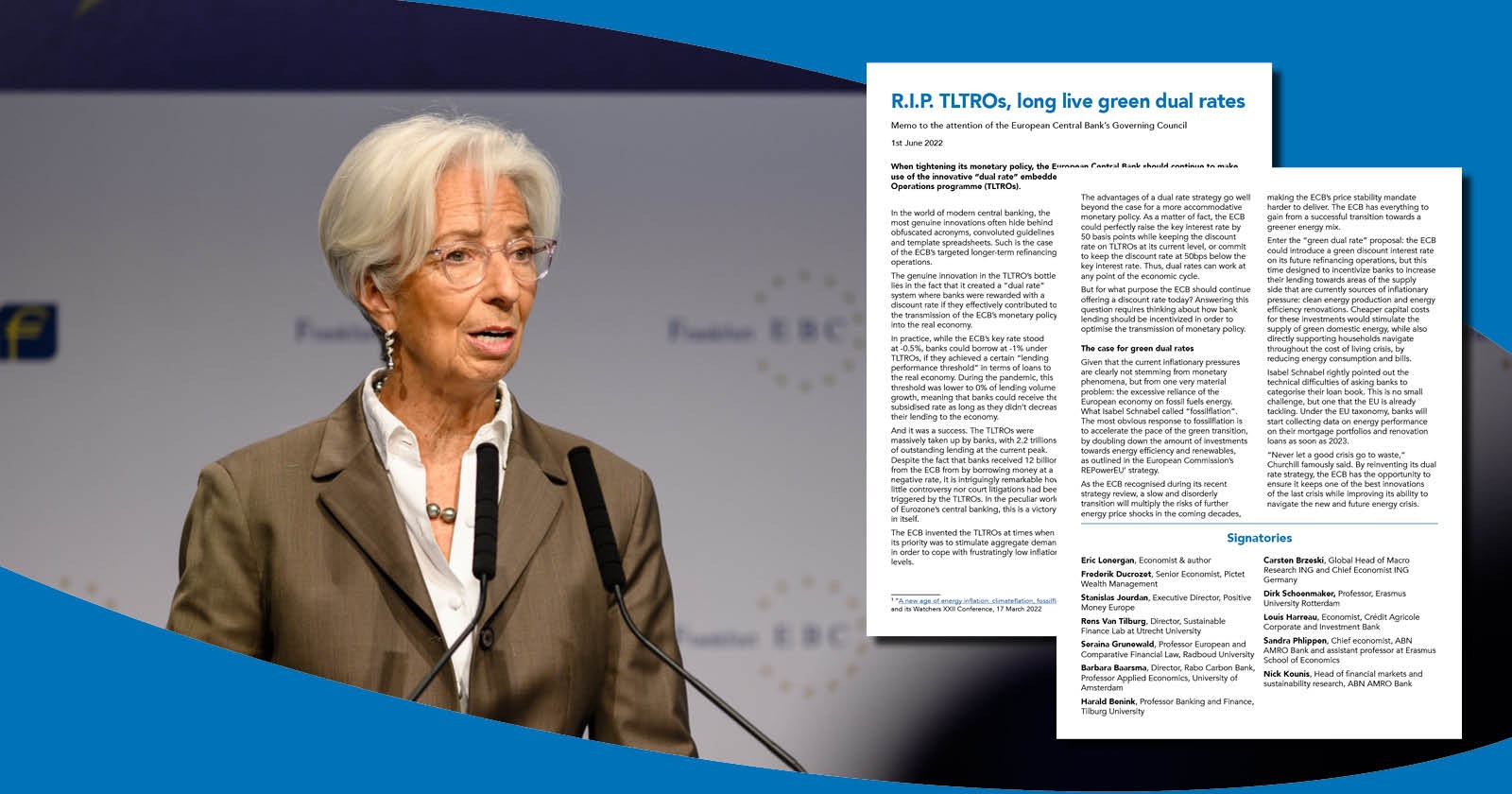Experts tell the European Central Bank to adopt lower rates for green loans

In an open letter to the European Central Bank (ECB), experts in banking, monetary policy and green finance supported Positive Money Europe’s proposal to introduce a lower interest rate that would encourage banks to lend to combat higher energy prices. Christine Lagarde already responded by saying she was “not giving up” on introducing such mechanism.
In response to inflation rising to record high levels of 8.1% in May, central banks globally are raising interest rates. The ECB has, until now ,resisted the pressure from financial markets and observers to follow suit. However, it is highly likely that the ECB’s Governing Council will finally cave in and raise the interest rates at its next meeting on 9 June.
We at Positive Money Europe, and experts, fundamentally disagree with these approach. As many experts have already pointed out, the current situation is different from the usual economic textbook, where inflation is taught to be a consequence of an excess of money supply in the economy.
Instead, today’s inflation is due to geopolitical shocks such as the war in Ukraine, rising oil and gas prices, and supply chain bottlenecks due the rapid reopening of economies after the pandemic. About half of the current inflation dynamics can be attributed to energy prices alone. By raising interest rates now, the risk is that the ECB will simply trigger a recession, creating more unemployment, while not having any effect at all on the energy prices.
The ECB must consider alternative solutions, which is why we took the initiative of writing an open letter (pdf) to the European Central Bank, together with experts and economists working in the banking sector.
“The complexity of this new conjuncture requires a more sophisticated response than simply raising interest rates across the board.” we told the ECB.
Instead, experts do support our “Green TLTROs” proposal, which we have been pushing over the past two years. Under this proposal, the ECB would only provide access to this type of cheap liquidity if commercial banks meet certain conditions, for example if they lend to green renovation projects.
The logic of the proposal is straightforward: to combat the inflation stemming from the volatility of fossil fuel prices, the ECB should design a new lending programme “designed to incentivise banks to increase their lending towards areas of the supply side where shortages are currently sources of inflationary pressure: clean energy production and energy efficiency renovations.”
Studies have shown that more than 200 billion euros are needed to fund green home renovation across the EU every year, and help families reduce their energy consumption and bills. However, access to funding is a key obstacle for millions of households, and current government subsidies are not enough. Access to zero-percent loans for renovation is therefore a critically missing piece of the puzzle.
Christine Lagarde is “not giving up” on green lending
The letter was communicated this morning to the European Central Bank and a dozen of other national central bank governors.
A few hours after receiving the letter, Christine Lagarde already gave encouraging signals about our proposal. Speaking in a panel at the Green Swan Conference, she said that she is not “giving up” on including green lending facilities in the ECB’s monetary policy toolkit:
“Japan is looking at it, China is doing it. Why wouldn’t we have an open mind about it? I know it is not squarely in the mandate and it is not necessarily in what we consider as the prime objective but, you know, if we don’t try, then, we have no chance of succeeding. So, count on me.” she said.
While Lagarde’s comments are extremely encouraging, the question remains as to whether the other 24 members of the Governing Council will agree on this approach when they meet next week.
So far, it seems that a consensus is forming among the ECB’s Governing Council to raise the interest rates, and this despite Lagarde recently admitting that doing so will not reduce energy prices. It seems that everyone knows raising interest rates will not really work, but not acting at all would look bad, since the ECB primary mandate is to control inflation.
More pressure will certainly be needed in order to ensure the European Central Bank thinks more creatively in the ways it can respond to the current crisis.
Click here to read the open letter.
Signatories of the letter include:
Eric Lonergan, Economist & author
Frederik Ducrozet, Senior Economist, Pictet Wealth Management
Stanislas Jourdan, Executive Director, Positive Money Europe
Rens Van Tilburg, Director, Sustainable Finance Lab at Utrecht University
Seraina Grunewald, Professor European and Comparative Financial Law, Radboud University
Barbara Baarsma, Director, Rabo Carbon Bank, Professor Applied Economics, University of Amsterdam
Harald Benink, Professor Banking and Finance, Tilburg University
Carsten Brzeski, Global Head of Macro Research ING and Chief Economist ING Germany
Dirk Schoenmaker, Professor, Erasmus University Rotterdam
Louis Harreau, Economist, Crédit Agricole Corporate and Investment Bank
Sandra Phlippen, Chief economist, ABN AMRO Bank and assistant professor at Erasmus School of Economics
Nick Kounis, Head of financial markets and sustainability research, ABN AMRO Bank